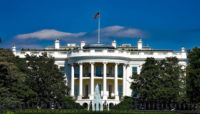The White House Defines Government Objectives Involving AI
October 28, 2024
President Biden issued the first-ever National Security Memorandum on Artificial Intelligence, outlining how the Pentagon, intelligence agencies and various national security groups should use artificial intelligence technology to advance national interests and deter threats, touching on everything from nuclear weapons to the supply chain. “The NSM is designed to galvanize federal government adoption of AI to advance the national security mission, including by ensuring that such adoption reflects democratic values and protects human rights, civil rights, civil liberties and privacy,” the White House announced in a statement.
The document is the latest in a collection that President Biden “has issued grappling with the challenges of using AI tools to speed up government operations — whether detecting cyberattacks or predicting extreme weather — while limiting the most dystopian possibilities, including the development of autonomous weapons,” writes The New York Times.

Most of the directives will take full effect after Biden exits the presidency, “leaving open the question of whether the next administration will abide by them,” notes NYT.
The new agency marching orders were announced by National Security Advisor Jake Sullivan, “who acknowledged that one challenge is that the U.S. government funds or owns very few of the key AI technologies — and that they evolve so fast that they often defy regulation,” NYT added.
CNET characterizes the new guidance “a call to action,” noting that while the U.S. “has been a global leader in artificial intelligence, [it] can’t take its advantage for granted.”
The framework requires “mechanisms for risk management, evaluations, accountability, and transparency,” the White House lists in a fact sheet that also stipulates “actions to improve the security and diversity of chip supply chains, and to ensure that, as the United States supports the development of the next generation of government supercomputers and other emerging technology, we do so with AI in mind.”
Unlike China, which aggressively funds and keeps a tight rein on tech developments, including AI, the U.S. has left most of the heavy lifting to the private sector. Sullivan acknowledged as much, contrasting the government’s role in nuclear physics, space exploration and the Internet with AI, for which “the private sector has propelled much of the last decade of progress,” per NYT.
“We are all familiar with past instances when we saw critical technologies and supply chains that were developed and commercialized here in the U.S. migrate offshore for lack of critical public sector support,” CNET reports of the memorandum, adding that the U.S. is now “laser focused on maintaining the strongest AI ecosystem in the world.”

No Comments Yet
You can be the first to comment!
Leave a comment
You must be logged in to post a comment.